By Lorenzo Tondo and Chris Michael
Compiled by: Shan Ouba, Golden Finance
The election has been called the most pivotal in American history and was undoubtedly one of the most turbulent, with the incumbent president dropping out of the race late in the campaign, one of the candidates being convicted of a crime, and several assassination attempts. We look back at some of the key moments in this political struggle against the backdrop of two global conflicts, a struggle that is at stake for the survival of American democracy.
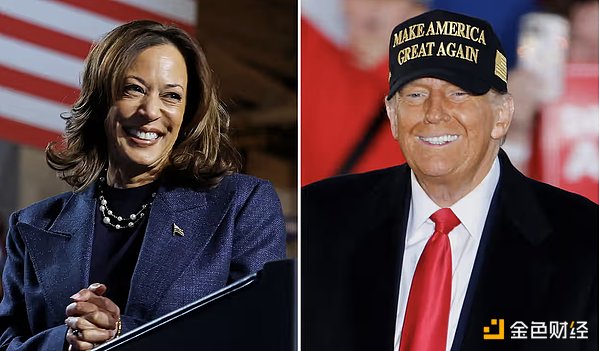
1. Challenger
Florida’s far-right governor, Ron DeSantis, was widely considered the most likely Republican candidate to prevent former President Donald Trump from becoming the party’s nominee in his third re-election bid. However, despite the endorsement of media mogul Rupert Murdoch, DeSantis ended his failed campaign in January and endorsed Trump. Trump’s team had smeared DeSantis as “Pudding Fingers” because of his eating habits. DeSantis almost ran as an incumbent candidate, but his last strong opponent was former South Carolina Governor Nikki Haley, who unexpectedly became the face of the anti-Trump ticket. Questioning Trump’s mental health and loyalty to the U.S. Constitution, the former UN ambassador won a large number of endorsements and persisted until Super Tuesday in March, when she finally announced her withdrawal, leaving Trump as the last major candidate for the 2024 Republican nomination.
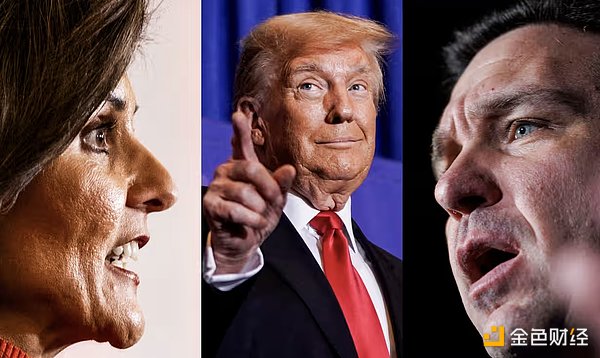
Nikki Haley (left) and Ron DeSantis (right) failed to stop Trump from becoming the Republican nominee for a third time. Image credit: Bloomberg, Getty Images, Reuters, EPA
2. President
In the history of American politics, incumbent presidents seeking reelection usually have a significant advantage in the election. However, Joe Biden - the oldest president in American history - has bucked the trend, as his often incomprehensible rhetoric, frequent gaffes and even incoherent speeches have raised concerns about whether he is too old to face Trump again. However, with almost no opponents, the 46-year-old US president won the Democratic primary and became the party's candidate in 2024, vowing that despite his advanced age, he is still the most capable candidate to defeat Trump.
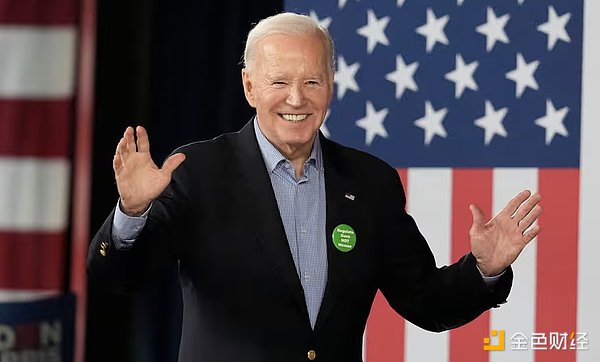
Joe Biden waves to supporters after speaking at a campaign event in March. Photo credit: Brynn Anderson/AP
3. Judgment
The first real tremor of the election campaign came on May 30, when 12 jurors in New York City convicted Trump, becoming the first former president in U.S. history to be convicted of a crime. The jury found him guilty of 34 counts of falsifying business records to cover up a $130,000 hush-money payment to porn star Stormy Daniels to conceal a scandal before the 2016 election. Trump’s legal troubles extend far beyond that: He faces more than 90 criminal charges, including a racketeering charge in Georgia alleging he conspired to overturn the results of the 2020 election, and the case also marked a milestone: the first detention photo of a U.S. president. (The case later took a dramatic turn when it was revealed that the prosecuting prosecutor, Fanny Willis, had an affair with the prosecutor she hired, and the case was suspended pending a judge’s decision on whether to disqualify her.) Separately, in February, a federal judge ruled that Trump must pay $83.3 million in damages to the writer E. Jane Carroll, who sued for defamation after Trump publicly denied allegations of sexual assault, which the judge found to be “substantially true.” Many other cases remain stagnant as Trump continues his usual legal strategy: delay, delay, delay.
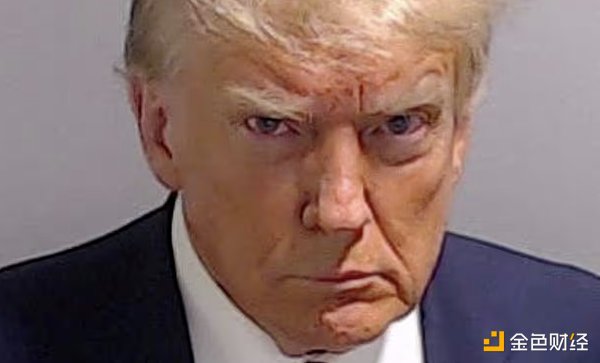
The Fulton County Sheriff's Office released a mugshot of Donald Trump. Image credit: Fulton County Sheriff's Office/Reuters
4. Debate
Biden’s performance in the first presidential debate, held in Atlanta, Georgia, on June 27, was perhaps the worst in U.S. history. He spoke hoarsely, hesitantly, stumbled several times, paused awkwardly, and even equivocated at times before declaring, “We finally beat Medicare.” Top Democrats and donors panicked, accusing the Biden campaign and the media of failing to take into account his significantly declining mental state. At 81, calls for Biden to step down are growing, and Democratic strategists are beginning to question whether a younger candidate should take on Trump.
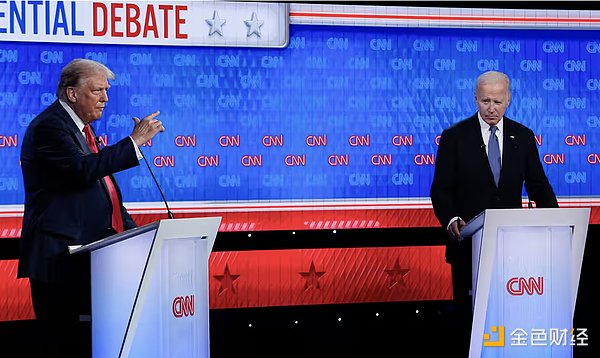
Trump and Biden faced off in their first presidential debate in June, where the president shocked Democrats with his poor performance. Photograph: Gerald Herbert/AP
5. Exemption ruling
On July 1, the U.S. Supreme Court made a stunning ruling: Trump is at least partially immune from criminal prosecution within the scope of his presidential “official conduct.” The ruling is a major victory for Trump, destroying the possibility that he will face a criminal trial for trying to overturn the results of the 2020 election, at least until a new election in November 2024. The ruling is also the latest demonstration of the right-wing power that has taken control of the Supreme Court, a situation that Trump has facilitated by appointing three ultra-conservative justices. Not only did the conservative justices overturn Roe v. Wade—a great victory for the anti-abortion movement that Trump is proud of, and the issue has become a focus again in the 2022 midterms and 2024 elections—but they also sparked even greater controversy in May when a photo showed an inverted American flag supporting Trump’s “Stop the Steal” campaign flying in front of Judge Samuel Alito’s home. Since the immunity ruling, special prosecutor Jack Smith has filed a new indictment with more concise charges. Trump responded by saying that if he is re-elected, he will fire Smith “in two seconds.”
6. Shooting
On July 13, at a campaign rally in Butler, Pennsylvania, Trump was shot in the right ear by 20-year-old Thomas Matthew Crooks, who fired an AR-15-style rifle from the roof of a nearby building. Crooks fired eight shots at Trump, who stood protected by security guards, raised his fist and shouted, "Fight, fight, fight!" This moment has become an iconic photo. The shooting killed one participant and seriously injured two others; Crooks was shot dead by security guards. Just nine weeks later, on September 15, Trump was again targeted for assassination, this time at his golf club in West Palm Beach, Florida, when the Secret Service found 58-year-old Ryan Wesley Roos hiding in the bushes with a rifle. These events not only triggered a crisis for the Secret Service, but also provided a powerful rallying cry for Trump's reelection: He appeared at the Republican National Convention after the Butler shooting wearing earmuffs to a rapturous ovation.

Suspected gunman shot dead after failed assassination attempt on Donald Trump
7. Withdrawal
At 1:46 p.m. on July 21, Biden announced that he would not seek reelection—ending weeks of intense speculation and intense pressure from lawmakers, donors, activists, and voters who had raised doubts about his ability to defeat Trump again. An intervention by actor and Democratic fundraiser George Clooney played a key role: “It’s cruel to say, but when I spent time with Biden three weeks ago, he was not the ‘big event’ Biden of 2010,” he wrote. Biden’s longtime political ally, former House Speaker Nancy Pelosi, also played a key role at a critical moment, deciding to limit the president’s legacy to one term, a “cool calculation” she called for the good of the country—she later told the Guardian that she had not been in touch with her old friend Biden since.
8. Coronation Ceremony
On August 23, with Biden’s full endorsement, Vice President Kamala Harris formally accepted the Democratic presidential nomination on stage in Chicago, becoming the first Black woman to lead a major political party. Harris declared this election a chance for America to “forge a new path forward” and encouraged voters to write “the next great chapter in the most extraordinary story ever told.” The impact of the move was immediate: She raised more than $1 billion in less than three months, setting a record, and drew enthusiastic crowds to energetic rallies where she focused on reproductive rights, economic aid for the middle class, and preserving American democracy.
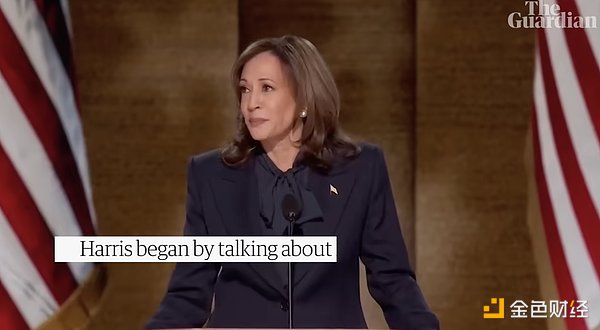
Kamala Harris accepts Democratic nomination, calls on Americans to 'fight for this country'
9. Dark Horse
Robert F. Kennedy Jr., the scion of America’s most famous Democratic family who once polled as high as 10% in national polls, has announced his withdrawal from the independent presidential race. Kennedy has faced a series of scandals, including an accusation of assaulting a former nanny. He also admitted that it was indeed him who dumped a bear carcass in Central Park a decade ago, a case that puzzled New Yorkers. Since dropping out of the race, the environmental activist has turned vaccine skeptic and has swung between the two parties - he reportedly approached Harris in August to discuss supporting her in exchange for a job, before choosing to support Trump, who allegedly promised to give him control of health agencies. Third-party candidates still in the running include environmentalist Jill Stein (who ran for president on behalf of the Green Party in 2012 and 2016), progressive activist Cornell West and Libertarian candidate Chase Oliver.
10. Vice Presidential Candidate
In July, Ohio Senator J.D. Vance formally accepted Trump’s nomination as his vice presidential candidate—a dramatic change of stance for Vance, the author of the bestselling memoir “Hill Country Elegy,” who had previously called himself “anti-Trump” and called his new boss “America’s Hitler.” But if there’s one line that J.D. Vance will be remembered for in history, it’s his controversial definition of leading the Democrats: “A bunch of cat ladies without kids,” he told Fox News host Tucker Carlson in 2021. Harris, on the other hand, chose Minnesota Governor Tim Waltz, a former teacher and high school football coach from rural Nebraska who served in the National Guard for 24 years before entering politics. Waltz has attracted national attention with his unexpectedly effective criticism of the Republican Party: “These people are just weird.”
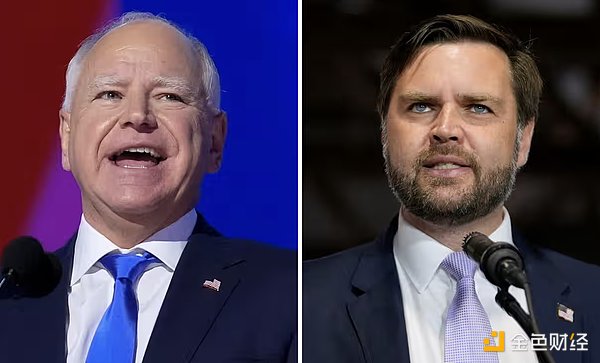
Vice presidential candidates: Tim Waltz (left) and JD Vance. Image source: Associated Press
11. Billionaire
The world’s richest man has officially announced what most people suspected after he bought Twitter and renamed it the more extreme X: He’s an out-and-out cheerleader for Trump. First by supporting Trump after the assassination attempt, then by dancing at Trump rallies, the boss of Tesla, Space X and several other companies has thrown himself into the latest of his many jobs with a passion that would put the most politically active billionaires to shame. Musk has become a Trump policy adviser, a mega-donor and (through his Pacific Alliance for America campaign) a leading figure in the Republican “ground game,” a campaign to get voters to the polls. In October, he also began giving away $1 million a day to Pennsylvanians who registered to vote—leading to a judge ordering him to appear in court on charges of running an “illegal lottery.” For those who ask what Musk gets out of this, observers point to billions of dollars in federal contracts and promises by Trump to get him involved in weakening regulators.
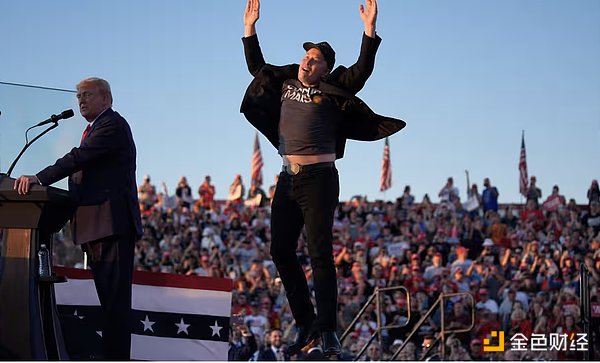
Musk jumps on stage at a Trump rally in Butler, Pennsylvania. Photograph: Evan Vucci/AP
12. Debate 2.0
Harris’s outperformance of Trump in their first debate, on Sept. 11, seemed to vindicate Biden’s decision to bow out gracefully and marked a sea change in her fortunes, as she narrowly edged Trump in the polls—though they remained largely flat for the rest of the campaign. The most eye-catching part of the debate, however, was not Harris’s win but the former president’s claim about Haitian immigrants: “In Springfield, they’re eating the dogs,” Trump said. “They’re eating the cats. They’re eating the pets of the people who live there.” The statement was soon immortalized by a popular song. It was an obvious lie, but it was quickly debunked. It seemed to hurt Republicans at first, but rather than disavow it, Trump and Vance began repeating it as part of an anti-immigrant focus that the campaign used as its driving principle, including a promise to conduct the largest deportation in U.S. history.
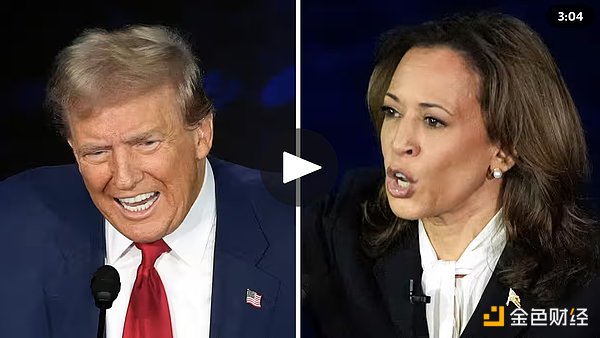
Harris vs. Trump: Presidential debate highlights
13. Celebrities
If Trump could count on the support of the world’s richest man, Harris could count on the backing of her biggest-selling artist. Minutes after the debate, Taylor Swift posted an Instagram post in support of Harris, encouraging fans to register to vote, signing herself “Childless Cat Lady,” a nod to Vance’s smear. She wasn’t the only one: Charli XCX had already set off a wave of pro-Harris memes on Twitter, posting “Kamala is the Brat”—a lifestyle inspired by the decadent rave culture of the 2000s and the title of her hit album, Brat—and eventually Beyoncé, Eminem (Barack Obama rapped his hit “Lose Yourself” at a rally in Detroit, and the superstar told his hometown to “speak up” for Harris), and dozens of other pop stars. From actors like Robert De Niro (who clashed with Trump supporters outside the former president’s hush money trial in New York) to the cast of Marvel’s Avengers movies to athletes like LeBron James (“When I think about my kids and my family and how they’re going to grow up, the choice is clear”), most of the highest-profile celebrity endorsements have gone to Harris — even though Trump can boast Hulk Hogan, Dr Phil and Kid Rock in his camp.
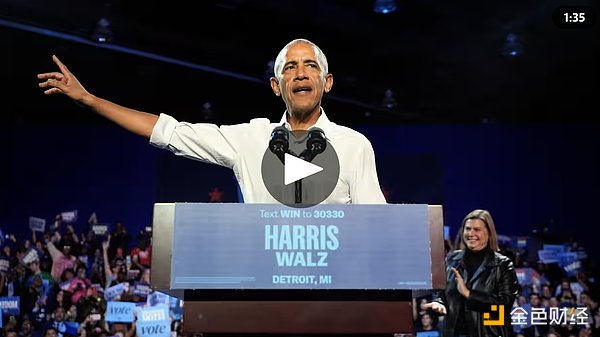
Obama raps on stage at Harris campaign rally
14. Assembly
Anger and vile rhetoric took center stage as Trump and his followers held a rally at New York's Madison Square Garden, where Trump unleashed racist comments, crude insults and threats against immigrants. The rally featured nearly 30 speakers, some of whom made a series of racist comments targeting Latino, African American and Jewish citizens. "I don't know if you know, but there's a literal floating island of garbage in the middle of the ocean right now. I think it's called Puerto Rico," said Tony Hinchcliffe, who made other controversial comments, including naming a black man while talking about watermelons. In the hours that followed, Democrats, celebrities and bipartisan Hispanic groups condemned the comments as "offensive" and "derogatory," with many Puerto Rican voters saying they would switch to Harris - who could be a key voting bloc in the swing state of Pennsylvania. The event has already drawn comparisons to the infamous Nazi rally held at the stadium in 1939, with the Democratic National Committee projecting images on the outside of the building repeating a claim by Trump's former chief of staff that he "praises Hitler" — and while Vance has denied the comparison, many have noted that it wasn't until 2016 that Vance himself suggested Trump could become "America's Hitler."
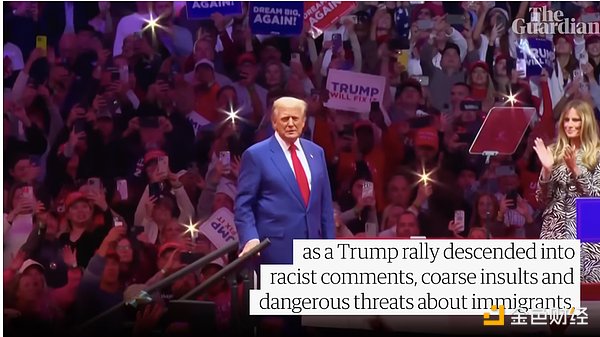
Donald Trump fills Madison Square Garden with anger, venom and racist threats
15. Final Pitch
The days before Election Day are always the craziest, and the 2024 race is no exception, with candidates trading insults and billions of people around the world watching the latest polls, which show neither Trump nor Harris with a clear lead. With the lights bright at the White House, Harris drew a crowd of more than 75,000 in Washington, D.C., who called Trump "another little tyrant" who stood in the same place nearly four years ago and incited a mob to storm the U.S. Capitol in an effort to cling to power. Meanwhile, Trump continued to smear immigrants and attended rallies in garbage trucks as a stunt to attack Democrats. Police chiefs and sheriffs across the country braced for potential violence against election workers, chaos at polling places and harassment of voters, while unfounded claims of voter fraud raised concerns that if Trump loses, he might once again refuse to accept the results — and this time, millions of Americans would do the same.















